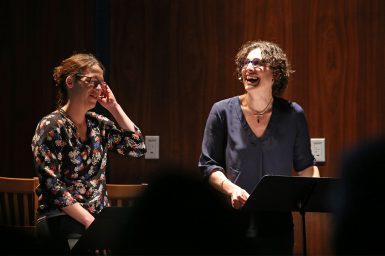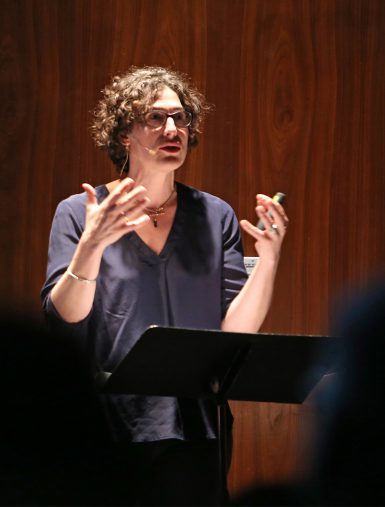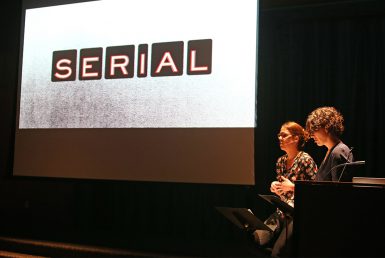Serial podcast team discusses first season phenomenon

The phenomenon that became Serial started out with modest hopes. Creators Julie Snyder and Sarah Koenig hoped for 300,000 listeners and gained five million. They wanted to bring to light important stories, and theirs won a Peabody award, the first podcast to earn the honor.
But most of all, the series changed the way the media world viewed podcasts. No longer was this a niche product for a small audience. Instead, podcasts are popular methods of storytelling with big audiences of devoted listeners.
Koenig and Snyder spoke to a packed Whittenberger Auditorium March 31 about the ups and downs of creating this unexpected success in their talk, “Binge-Worthy Journalism.” Their visit was part of the Hutton Honors College’s Many Worlds, One Globe series.
The two described how they created Serial, a side project of their producing work on This American Life, the first podcast to gain national distribution and recognition. The story was straightforward on paper: They wanted to investigate the 1999 death of Hae Min Lee, a popular high school student in Baltimore, and the subsequent conviction of Adnan Syed, Lee’s boyfriend at the time. Syed, to this day, proclaims he is innocent.
Snyder and Koenig started creating podcast in Koenig’s basement, buried under pillows and blankets to drown out any outside noise. When they first started the project, they had no idea Serial would become a success.
“We thought there was no pressure. Nobody listens to podcasts,” said Snyder. “We knew we wanted 300,000 listeners. We hit that goal three days later. Six weeks later, we had five million downloads.”
These were record-breaking numbers in the industry, and no one, especially not Koenig nor Snyder, expected this kind of success.
“This was my first murder case,” said Koenig. “But narrative journalism is not new. So how could this kind of success have happened?”
Koenig and Snyder attributed much of Serial’s success to the story and its central characters. They interviewed many of the people involved – some directly and some tangentially — showing how people’s memories and recollections often are flawed or wrong or simply different from others’. They fact-checked what they heard, even examining cell tower capabilities to verify times and dates of phone calls various sources said they had made.
“I was compelled by the story,” said Koenig. “I loved the world of it: high school, the central characters, love, immigrant families, detective work.”
Koenig reported on all of this for a year before the two began producing the podcast. Then, they continued to report and research right up to the final episode. This was so any new information that came to light over the course of the series could be addressed.

Snyder said this, along with Koenig’s style of reporting, made the podcast feel alive and vital, which is what they both wanted. When Koenig would talk to subjects and report for that week’s episode, she didn’t pretend that she knew all of the answers. Snyder credited the show’s appeal to that style of reporting as well.
“It puts you in a vulnerable position to admit you don’t know something,” said Snyder. “I think it’s ballsy to be honest in your reporting and not pretend you know everything.”
Although much of the reporting in Serial is through first-hand accounts of people like Syed, many people, including detectives, prosecutors and Syed’s attorney, did not want to talk to Koenig and Snyder. So, the women had to fill in the gaps of the story through the Maryland Public Information Act, which allows access to all documents released from the case.
The authorities handed over a PDF of 2,000 disjointed, redacted and, sometimes, irrelevant documents.
“It was like asking for a sweater and getting a big angry ball of yarn,” Snyder recalled.
Despite their difficulties in reporting and figuring out an ending to the story, Snyder and Koenig managed to finish the first Serial series. When they began releasing it, one episode at a time, they were blind-sided by its overnight success.
Serial blew up the internet, especially Reddit, a popular news discussion and aggregation site. At one point, Koenig and Snyder counted 40,000 discussion boards dedicated to their show. Each week, after the release of the latest episode, thousands of people took to their computers and parsed through every detail and made predictions for next week.
“This filled us with anxiety,” said Koenig. “The rules of Reddit are not the same as our rules. We have to source. And it’s not just about the information we did put out there. We left a lot of stuff out and were mindful that these were real people with real lives.
“We didn’t post photos, we kept personal information out as much as possible. But on Reddit, people posted personal information and speculated about the murder. We pleaded with Reddit to regulate it, and they did, but it eventually got too big.”
“We did not want to see this happen,” Snyder added. “This was the first time that we felt like we were losing control of our work. When you work on something this sensitive, it’s concerning.”
Serial didn’t just become a phenomenon on Reddit, though. People began creating weekly podcasts about Serial. Koenig and Snyder were parodied on Saturday Night Live. There were thousands of news stories coming out about everything from the people in the series to whether or not Koenig was having a love affair with Syed.
“People were sharing and bonding over our show, and that’s pop culture,” said Snyder. “It was a pretty amazing and exciting thing to witness.”

Since the success of Serial’s first season, Koenig and Snyder have finished and released the second season, which focused on Bowe Bergdhal, a United States soldier abandoned his post in Afghanistan and was captured by the Taliban. The women have also just released the first season of their spin-off show, S-Town.
Now, Koenig and Snyder are trying to ride this new wave of success and continue putting captivating stories out into the world. After all of this chaos since the release of Serial, this recent demand of good audio storytelling has restored Snyder’s faith.
“We are so often told that we’re morons,” said Snyder. “But that’s not true. This response shows that we do have patience for a journey that takes its time. That’s heartening for us.”
More:

